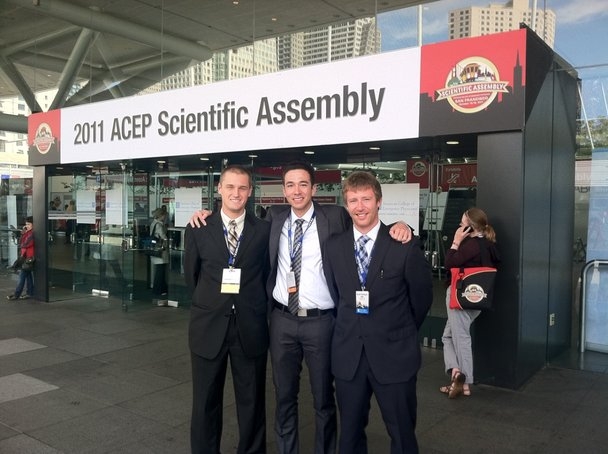Student Achievements
American College of Emergency Physicians Research Showcase
March 15, 2014

by Kevin Wolf, PAS
Each year, emergency medical professionals gather at the international American College of Emergency Physicians (ACEP) Scientific Assembly. This year's conference took place in San Francisco on October 15th and 16th. The Scientific Assembly highlights current research endeavors and touches on various topics in emergency medicine, such as screening guidelines, diagnostic testing, epidemiologic data, and current treatment modalities, among many others.
My two research colleagues (both fourth year medical students at MSU College of Human Medicine) and I were invited to perform a lightning oral presentation of our research project. A lightning oral presentation is essentially a rapid version of a full oral presentation. We were one out of only twenty-eight researchers invited to present and we were among some of the only students to present at the Scientific Assembly; the other presenters were either MD or DO attending physicians or resident physicians.
Our research project is entitled "Assessment of Risk Factors for Post-Rewarming Rebound Hyperthermia in Cardiac Arrest Patients Undergoing Therapeutic Hypothermia.” Therapeutic hypothermia is a relatively new treatment modality in certain cardiac arrest patients who have been successfully resuscitated with return of spontaneous circulation to salvage the neurons in the brain from potentially dying off. However, a frequent complication that occurs among these patients is something known as rebound hyperthermia, which is defined as a core body temperature of greater than 38.5°C within twenty-four hours of completion of the cooling protocol. Therefore, the goal of our project was to identify potential risk factors associated with rebound hyperthermia and to describe the survival trends among those patients who experienced rebound hyperthermia. Unfortunately, we were not able to identify any significant risk factors associated with rebound hyperthermia. We were, however, able to associate rebound hyperthermia with a higher rate of mortality.
Overall, this was a very worthwhile experience for my colleagues and I, as we were able to interact as members of the emergency medicine community. The inter-professional nature of this project made it unique and each one of us felt extremely privileged and honored to be able to present alongside many distinguished researchers. Furthermore, the presentation was received well by the audience, making this experience special for us, in that we were able to reflect and celebrate our hard-earned research achievements. Lastly, I would certainly encourage other graduate students to pursue similar conferences related to their profession.

